Standard Bank Group Bundle
How Well Do You Know Standard Bank Group?
Journey back in time to uncover the fascinating Standard Bank Group SWOT Analysis. Established in 1862, this South African bank has grown into a financial powerhouse. From its humble beginnings, it has played a pivotal role in shaping the African financial landscape.
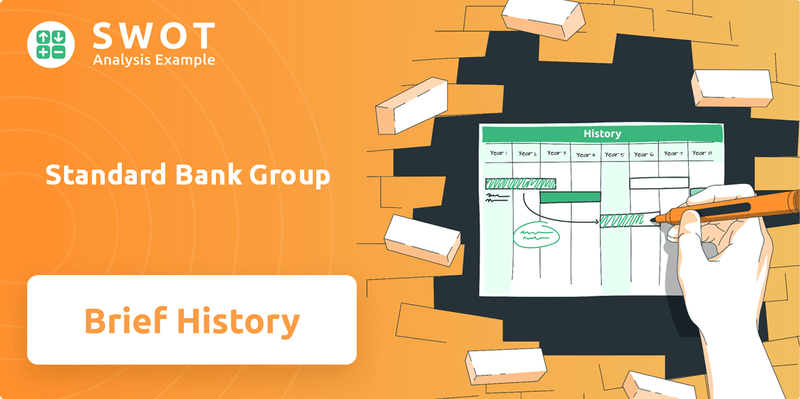
Delving into the brief history of Standard Bank Group company reveals a story of resilience and strategic growth. The African financial institution's early years were marked by supporting the burgeoning economy, particularly during the diamond rush. Understanding Standard Bank history is crucial to grasping its current influence across the continent and beyond. The group's evolution reflects its adaptability and commitment to the banking industry.
What is the Standard Bank Group Founding Story?
The Standard Bank Group, a prominent South African bank and leading African financial institution, has a rich history rooted in the economic boom of the 19th century. Its origins are closely tied to the burgeoning diamond industry in the Cape Colony, which created a need for robust financial services. This need led to the establishment of what would become a major player in the banking industry.
The Standard Bank history begins on October 15, 1862, when it was officially registered as The Standard Bank of British South Africa. Operations began in 1863 in Port Elizabeth, South Africa. The bank's formation was a direct response to the financial demands of the diamond rush, a period of rapid economic expansion. This expansion saw a significant influx of capital and a need for financial services to support trade and mining.
The initial business model focused on commercial banking, offering essential financial services to support the rapid economic development. This included facilitating transactions, providing credit, and managing wealth for individuals and businesses. The funding came from British investors, reflecting its 'British South Africa' designation, aiming to capitalize on colonial economic expansion. The cultural and economic context, marked by colonial expansion and resource extraction, shaped the bank's establishment, creating a favorable environment for a financial institution to support large-scale commercial activities.
The establishment of the bank was a direct response to the economic opportunities presented by the discovery of diamonds in the Cape Colony.
- The bank's operations started in 1863 in Port Elizabeth, South Africa.
- The primary focus was on commercial banking, supporting trade and mining operations.
- British investors provided the initial funding, reflecting the colonial context.
- The bank played a crucial role in facilitating the economic activities of the time.
Standard Bank Group SWOT Analysis
- Complete SWOT Breakdown
- Fully Customizable
- Editable in Excel & Word
- Professional Formatting
- Investor-Ready Format
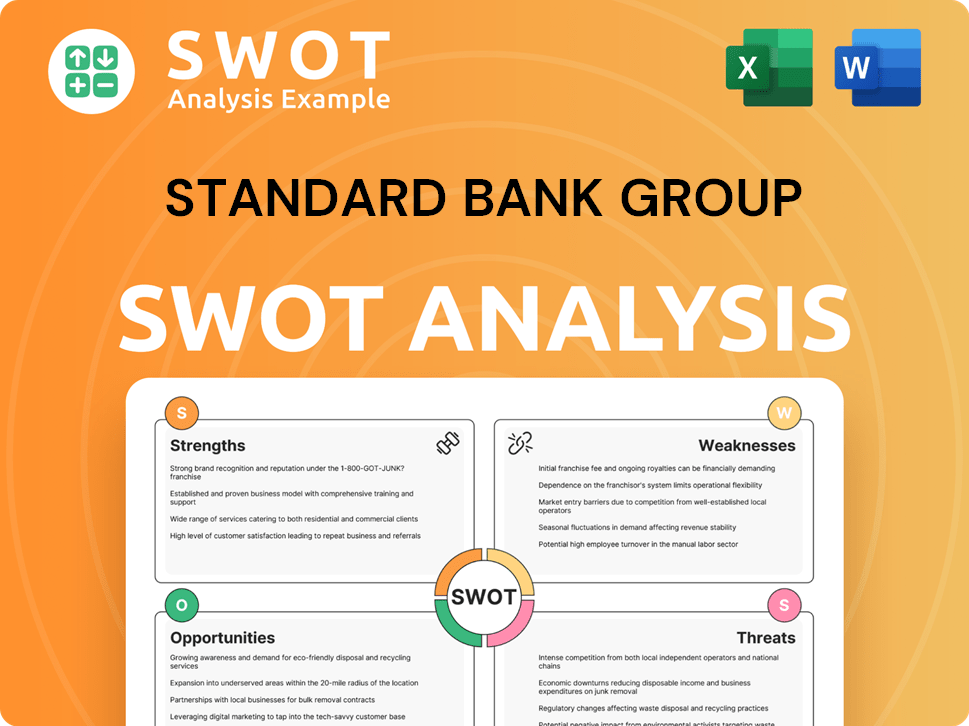
What Drove the Early Growth of Standard Bank Group?
The early growth of the Standard Bank Group, a prominent South African bank, was significantly shaped by the economic environment of Southern Africa. Established in 1862, the bank quickly expanded its footprint across the region, coinciding with the growth of key industries like mining. This expansion was characterized by the establishment of numerous branches throughout South Africa.
By 2024, Standard Bank operated a vast network, including 1,168 branches and 5,562 ATMs. This extensive network reflects the bank's commitment to accessibility and its long-standing presence in the region. The continued investment in physical infrastructure underscores its strategy to serve a broad customer base.
The
In the early 1990s, Standard Bank began building its franchise outside Southern Africa, marking a shift towards becoming a pan-African institution. This strategic move into new geographical markets and product categories was a key decision that shaped its trajectory. This expansion was a pivotal moment in the bank's history.
As of 2024, the group had a presence in over 20 Sub-Saharan African countries. This continuous growth and market reception, combined with strategic leadership transitions, allowed Standard Bank to become Africa's largest banking group by assets. The bank's ability to adapt and expand has been a key factor in its success.
Standard Bank Group PESTLE Analysis
- Covers All 6 PESTLE Categories
- No Research Needed – Save Hours of Work
- Built by Experts, Trusted by Consultants
- Instant Download, Ready to Use
- 100% Editable, Fully Customizable
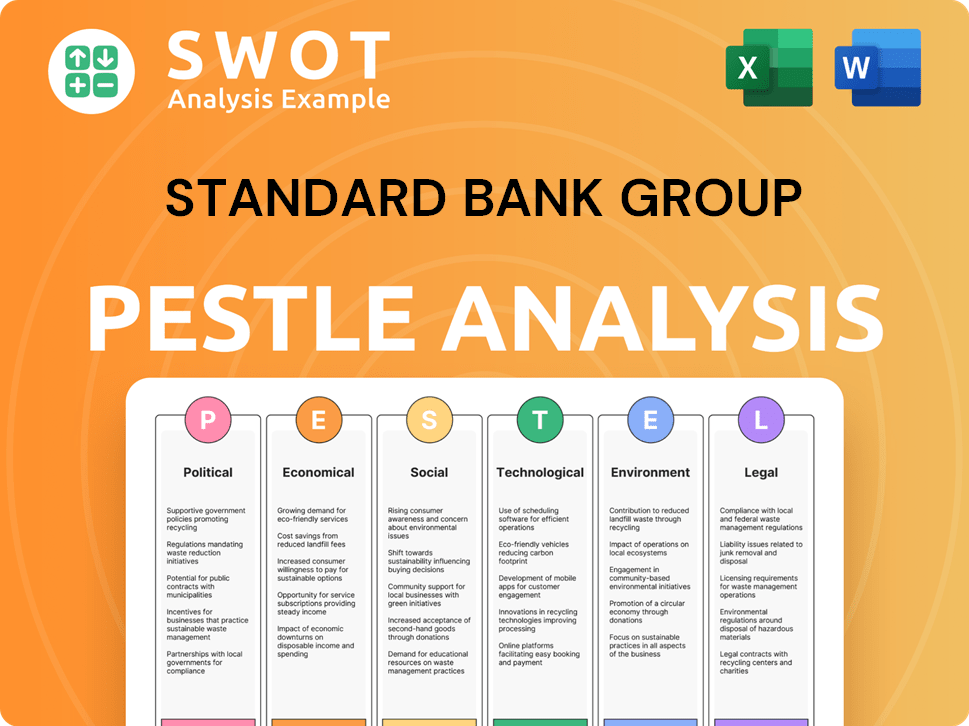
What are the key Milestones in Standard Bank Group history?
The Standard Bank Group, a prominent African financial institution, has achieved several key milestones throughout its history. As a leading South African bank, its journey reflects significant growth and strategic adaptations within the banking industry.
| Year | Milestone |
|---|---|
| 2024 | Mobilized over R21 billion in sustainable finance in the first half of the year. |
| 2024 | Received 'Investment Bank of the Year' for Africa by The Banker Investment Banking. |
| 2024 | Awarded 'Best Bank for Transaction Banking' in Africa by Global Finance World's Best Treasury & Cash Management Providers. |
The group has focused on digital transformation to enhance its services and customer experience. This strategic shift has led to a measurable increase in digitally active retail clients.
The bank's digital transformation efforts have led to a 6% increase in digitally active retail clients as of March 2025. This focus includes enhanced online banking platforms and mobile applications.
The group is actively involved in sustainable finance, having mobilized over R21 billion in the first half of 2024. The cumulative total since 2022 is R127 billion, with a target of over R250 billion by 2026.
Despite its successes, the Standard Bank Group has faced challenges, including market downturns and competitive pressures. In 2024, the group experienced a modest 3% loan growth due to economic factors.
The group navigated market downturns, particularly in consumer credit. Weak consumer credit affordability and high credit impairments impacted loan growth.
High credit impairments, especially on mortgages and personal unsecured loans in South Africa, affected financial performance. The credit loss ratio, however, was reduced to 83 basis points in 2024 from 98 in the previous year.
Standard Bank Group Business Model Canvas
- Complete 9-Block Business Model Canvas
- Effortlessly Communicate Your Business Strategy
- Investor-Ready BMC Format
- 100% Editable and Customizable
- Clear and Structured Layout
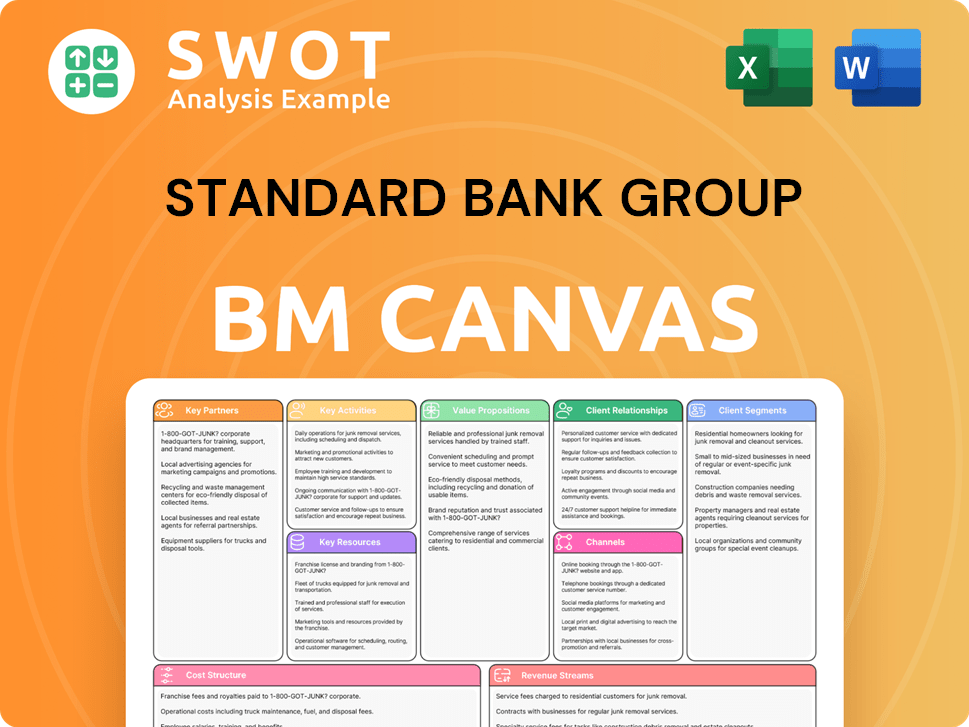
What is the Timeline of Key Events for Standard Bank Group?
The Standard Bank Group's history is a story of growth and strategic adaptation, evolving from its origins in 1862 to become a leading African financial institution. The company has consistently expanded its operations and services, reflecting its commitment to the African continent. Key milestones highlight its journey, from its establishment as The Standard Bank of British South Africa to its listing on the Johannesburg Stock Exchange and its recent financial achievements.
| Year | Key Event |
|---|---|
| 1862 | Founded as The Standard Bank of British South Africa, marking the beginning of the |
| 1863 | Commenced operations in Port Elizabeth, South Africa, starting its journey as a |
| 1970 | Listed on the Johannesburg Stock Exchange (JSE), a significant step in its corporate development. |
| Early 1990s | Began building its franchise outside Southern Africa, expanding its reach as an |
| 2022 | Full acquisition and integration of Liberty into the group's insurance and asset management division, expanding its service offerings. |
| 2024 (H1) | Reported headline earnings of R22 billion, a 4% increase, with a return on equity (ROE) of 18.5%. |
| 2024 (FY) | Achieved headline earnings of R45 billion and a return on equity (ROE) of 18.5%. Total assets reached R3.3 trillion. |
| 2024 (FY) | Active clients grew by 4% to 20 million clients, with digitally active retail clients in South Africa increasing by 6%. |
| 2024 (FY) | Mobilized R74 billion in sustainable finance, contributing to a cumulative R177 billion since 2022. |
| 2025 (March) | Reaffirmed its 2025 financial guidance, expecting mid-to-high single-digit revenue growth and an ROE between 17% and 20%. |
Looking ahead,
The group is focused on achieving its 2025 strategic goals, targeting a return on equity of 17%-20% and a cost-to-income ratio of 50%. For 2026-2028, an upgraded ROE target of 18%-22% has been set, backed by plans to scale across Africa.
The bank is positioning itself to capitalize on Africa's economic growth by prioritizing energy and infrastructure projects. It is also leading the transition to renewable energy and building a private banking platform for high-net-worth individuals across the continent.
The
Standard Bank Group Porter's Five Forces Analysis
- Covers All 5 Competitive Forces in Detail
- Structured for Consultants, Students, and Founders
- 100% Editable in Microsoft Word & Excel
- Instant Digital Download – Use Immediately
- Compatible with Mac & PC – Fully Unlocked
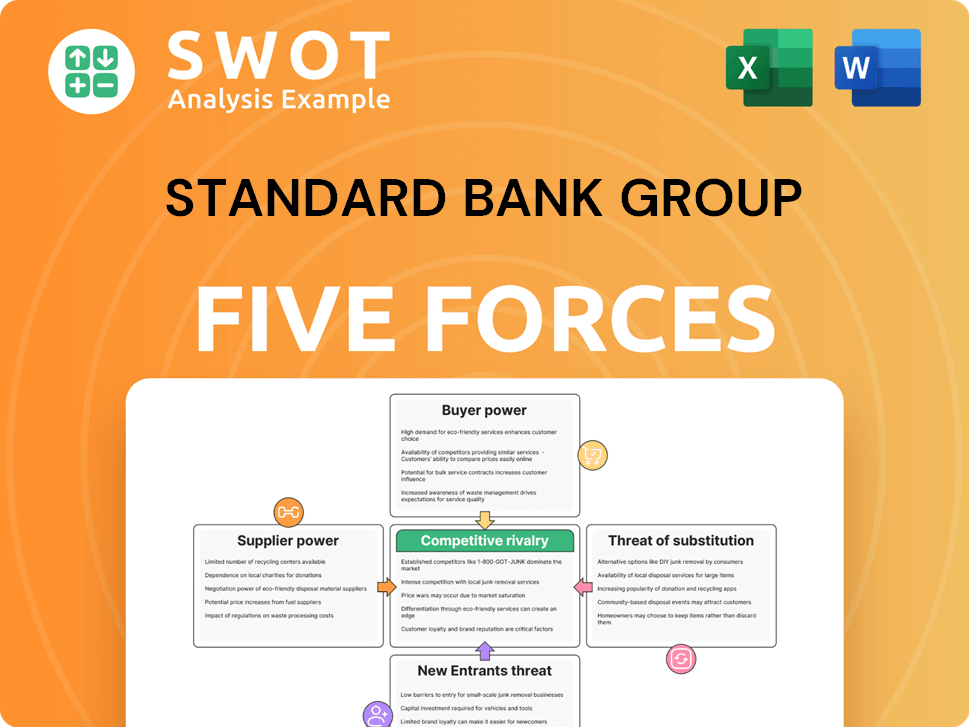
Related Blogs
- What is Competitive Landscape of Standard Bank Group Company?
- What is Growth Strategy and Future Prospects of Standard Bank Group Company?
- How Does Standard Bank Group Company Work?
- What is Sales and Marketing Strategy of Standard Bank Group Company?
- What is Brief History of Standard Bank Group Company?
- Who Owns Standard Bank Group Company?
- What is Customer Demographics and Target Market of Standard Bank Group Company?
Disclaimer
All information, articles, and product details provided on this website are for general informational and educational purposes only. We do not claim any ownership over, nor do we intend to infringe upon, any trademarks, copyrights, logos, brand names, or other intellectual property mentioned or depicted on this site. Such intellectual property remains the property of its respective owners, and any references here are made solely for identification or informational purposes, without implying any affiliation, endorsement, or partnership.
We make no representations or warranties, express or implied, regarding the accuracy, completeness, or suitability of any content or products presented. Nothing on this website should be construed as legal, tax, investment, financial, medical, or other professional advice. In addition, no part of this site—including articles or product references—constitutes a solicitation, recommendation, endorsement, advertisement, or offer to buy or sell any securities, franchises, or other financial instruments, particularly in jurisdictions where such activity would be unlawful.
All content is of a general nature and may not address the specific circumstances of any individual or entity. It is not a substitute for professional advice or services. Any actions you take based on the information provided here are strictly at your own risk. You accept full responsibility for any decisions or outcomes arising from your use of this website and agree to release us from any liability in connection with your use of, or reliance upon, the content or products found herein.